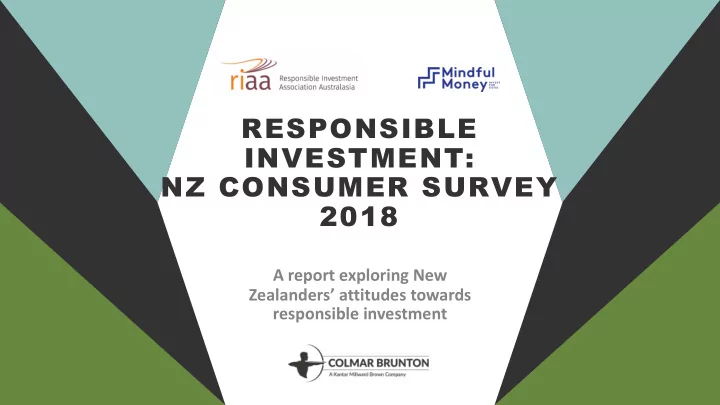

RESPONSIBLE INVESTMENT: NZ CONSUMER SURVEY 2018 A report exploring New Zealanders’ attitudes towards responsible investment
Methodology +/-% . METHOD TIMING MARGIN OF ERROR 1,000 New Zealanders aged 18+ The survey took place from The maximum margin of error on completed the survey online. 27 August to 3 September, 2018. the total sample of 1,000 is +/-3.1%. The survey took nine minutes on average and a response rate of 38% was achieved. The sample has been weighted to be representative of the NZ population aged 18+ by age, gender and region. Significant differences noted throughout this report denote results that are different to the average (i.e. total). These are statistically significant at the 95% confidence level. 2
Expect responsibility Agree Disagree (nett) (nett) 3 8 2 16 39 32 72 9 % Not sure Strongly disagree Disagree Neither agree nor disagree Agree Strongly agree 3
Moving investments I would consider moving my KiwiSaver to another provider / investment elsewhere if I found % out they were investing in companies that engage in activities not consistent with my values Agree Disagree (nett) (nett) 62 7 9 4 4 22 46 16 Not sure Strongly disagree Disagree Neither agree nor disagree Agree Strongly agree Less likely to agree (nett): More likely to agree (nett): • Those aged under 30 (55%) • Household income over $200,000 (87%) • Those who are ‘consciously environmentally friendly’ (74%) • Those who have university qualifications (70%) • Women (67%) 4
How important is it that your KiwiSaver or investment avoids the following? Important (nett)* Animal cruelty 6 23 64 93 % Human rights abuses 7 25 61 93 90 Labour rights abuses 14 33 43 Tobacco 83 14 23 46 Somewhat important Important Gambling 18 27 36 82 Very important Palm oil 81 20 29 32 Military weapons 78 19 23 36 Personal firearms 78 14 23 40 Fossil fuels 25 29 22 76 Junk foods 27 28 20 74 Adult entertainment/pornography 74 17 18 39 Nuclear power 74 14 21 39 Genetic engineering (GMOs) 22 21 22 65 Alcohol 26 23 15 63 5
Avoiding or engaging? Is it more important for an investment company to… % 72% avoid (nett) 24 15 33 14 14 Avoid the Avoid the worst Don’t avoid Unsure Avoid sectors worst companies in any sector, companies, that you companies in and include more but engage don’t agree any sector companies with higher with them with standards to change practices 6
Perceived Barriers % Agree Disagree (nett) (nett) 50 8 There is not enough independent information available 49 17 I don’t have the time to look at all the options and compare them 12 There seems to be a lack of credible options to invest in 29 It’s too hard to switch 33 26 I don’t have enough money in KiwiSaver/in my investments so it’s not worth changing 39 25 I think ‘ethical’ KiwiSaver funds / investments perform better over the long term 8 21 I don’t believe the claims made by funds describing their offer as ‘responsible’, 11 21 ‘sustainable’ or ‘ethical’* 16 14 'Ethical’ investment funds are too expensive 7
Certification Likelihood to invest in a financial scheme with independent % certification as a ‘responsible or ethical investor’ More Less likely likely (nett) (nett) 73 4 13 24 48 24 Much less likely Slightly less likely Neither more nor less likely Slightly more likely Much more likely 8
Sources of financial advice % Personal research – online, newsletters, magazines, news etc. Personal research – online, … 47 KiwiSaver provider KiwiSaver provider 29 Bank or other non-KiwiSaver financial services provider Bank or other non-KiwiSaver financial… 28 Friends / family who have relevant… Friends / family who have relevant qualifications 27 Advice from friends or family (41%) Friends / family who do not have… 23 Friends / family who do not have relevant qualifications Accredited financial planner/advisor 21 Accredited financial planner/advisor Comparison website Comparison website 20 Accountant Accountant 17 Government websites Government websites 17 Somewhere else Somewhere else 1 None of these None of these 10 9
Perceptions of responsible investment by age 1 8 – 2 9 Y E A R O L D S 6 0 + Y E A R O L D S • 73% have KiwiSaver; 11% intend to in future • Have other investments than KiwiSaver • 80% of balances < $30,000) • Higher Kiwisaver balances (6% over $100,000) • Tend to choose main bank as KiwiSaver provider • More likely to choose KiwiSaver for sustainability • Financial advice sourced from friends/family • Financial advice from financial planner or accountant • More likely to believe ethical funds perform • Place more importance on avoiding investments better over the long-term More likely to expect ct their KiwiSaver and • in investments to be in invested responsib ibly ly Findings summarised above are more common among these age groups than among the other age groups 10
Download the report www.responsibleinvestment.org/consumer-polling www.mindfulmoney.nz/survey2018
Recommend
More recommend